Implant Dentistry
- Single Tooth Replacement Using Implants
- Multiple Teeth Replacement Using Implants
- Implant Supported Dentures
- Basal Implants
- Immediate Loading Implants ( Teeth in weeks!)
The modern method of replacing missing teeth. Research shows that 85% of people who wear full or partial dentures experience some related discomfort and difficulty. Dental implants can eliminate those problems, restore self-confidence and improve the quality of life. From a single missing tooth to an entire set of teeth, dental implants can provide a permanent alternative to problem dentures, and help prevent the premature loss of remaining teeth. Dental implants can last a lifetime and are an excellent investment in oral health.
Q: What are dental implants?
A: Dental implants are made of biocompatible materials that become directly attached to your jawbone. In dental terms, this is called "osseointegration." Once anchored in place, your implants can be used to replace a missing tooth, support an entire set of teeth or retain an overdenture. The result is a natural type of tooth replacement that can restore the biting and chewing ability you once enjoyed, improve your appearance and renew your self-confidence.
Q: What procedures are used to insert dental implants?
A: Placement of dental implants is a minor surgical procedure performed in one or two office visits. If you have one-stage implants, their metal tops will extend through the gums while your tissues heal, and you will not need a second surgery. If you have two-stage implants, they will be placed under the gums while the bone heals. You will need a second, simple surgery to uncover them and attach a post to support your replacement teeth. Your dentist's decision to do a one- or two-stage surgical procedure depends on a number of clinical factors, such as the amount of available bone and location of the implants. After the implants are placed, the bone attaches to them and permanently anchors them within your jaw. In the meantime, your dentist may adjust your full denture or partial prosthesis for temporary use.
Restoration
Q: What restorations can dental implants provide?
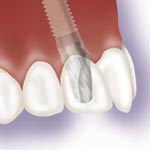
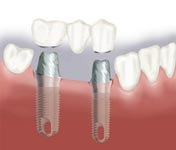
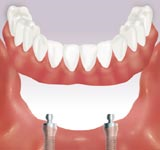
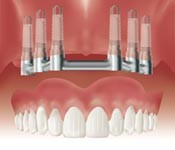
Wisdom Teeth: To Keep or Not
What are wisdom teeth?
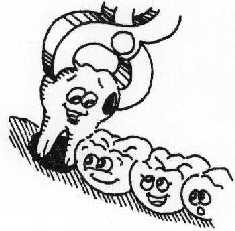
These are not extra teeth like most of us think. They are part of our normal set of teeth. Each one of us has 32 teeth. 28 would have erupted into the mouth by the time we are 13 years of age. The last four, one in each end of the upper and lower jaws are the wisdom teeth. There is a sequence of eruption and it just so happens that the wisdom teeth are the last ones to erupt at the age of 18 to 24 years of age. By then there is usually a lack of space for them to erupt properly and so most are always stuck(IMPACTED). So we always have this idea that they are extras!
Do we need to remove them?
There criteria most Dental Surgeons will have to determine whether that wisdom tooth of yours need to be removed.
These are:
- They have given you gum pains before. These pains will usually subside after some medications and then will recur at a later date. No one can predict the frequency and severity of these recurring pains. They may or may not be accompanied by swelling and pustulent products.
- They have caused cavities in the teeth in front of them due to food trapping or they themselves have cavities from food trappings. These are usually determined by the dental surgeons after a check up or through x-rays results.
- They interfere with the treatment you are having. Usually this will happen in those who seek braces treatment.
- They are constant causes of food trapping and irritation.
What is an Impacted Wisdom Tooth ?
A tooth becomes impacted due to lack of space in the dental arch and its eruption is therefore prevented by gum, bone, another tooth or all three. Lack of space occurs because our jaws have become smaller (through evolution), we do not loose teeth through decay as frequently as in the past, and our diet is such that our teeth do not wear down as much.
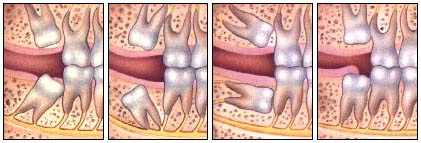
How are they removed?
There are two methods of removing wisdom teeth. They can be by simple extraction or they are removed by simple minor surgical procedures. These are determined by their degree of impaction.
Removing wisdom teeth either by extraction or surgery can be performed under local anaesthesia or under general anaesthesia.
Local anaesthesia means that they can be done in the clinic when you are fully awake or sedated.
General anaesthesia will mean removing them while you are asleep and is usually done in a hospital environment under Day Surgery.ie. you go home about four hours after the procedure is performed. These can be carried out either in the private hospitals or restructured hospitals. The surgeons can be private practitioners or from government service.
The healing process begins immediately after surgery as your body sends blood to nourish the tooth socket. Simple pressure from a piece of gause is usually all that is needed to control the bleeding and to help a blood clot to form in the socket, which promotes healing. Within a day or two, soft tissue begins to fill in the socket, aided by the blood clot. Eventually, the bone surrounding the socket begins to grow, eventually filling in the socket completely, as illustrated here:

(note that there is a possibility of a swelling developing in the area which is normal and will reduce within a short time)
The Pro's and Con's of Wisdom Tooth Removal
Some Pro's of Removing a Wisdom Tooth:
- Wisdom teeth may be hard to access with your toothbrush or floss. Over time, the accumulation of bacteria, sugars and acids may cause a cavity to form in the tooth. If it is not restored with a filling, the cavity may spread and destroy more tooth structure causing severe consequences to the tooth and surrounding supportive structures.
- Due to the difficulty of keeping these teeth clean with your daily home care (brushing and flossing), bacteria and food debris remaining on the wisdom teeth may produce a foul smell-causing bad breath.
- A wisdom tooth that is still under the gums in a horizontal position (rather than a vertical position) may exert pressure to the surrounding teeth, causing crowding and crooked teeth. This also may occur if there is not enough space in the mouth for the wisdom tooth. This may warrant braces to repair the damage.
- A wisdom tooth that is still under the gums may become irritated. The gum tissue that lays over the tooth may harbor food debris and bacteria that gets trapped under the gum, resulting in an infection in the gums.
Some Con's of Removing the Wisdom Teeth:
- Depending on the size shape and position of the tooth, removal can vary from a simple extraction to a more complex extraction. With a simple extraction, there is usually little swelling, bruising and/or bleeding. More complex extraction will require special treatment, which may result in more bruising, swelling and bleeding. However, your dental professional will provide you with post treatment instructions to minimize these side effects.
- Following an extraction, a condition called "dry socket" may occur. If the blood clot that formed in the extraction area becomes dislodged, it exposes the underlying bone. This condition is very painful, but resolves after a few days. It is preventable by following the post treatment instructions provided by your dental professional.
- The longer you wait and the older you get, there is the potential for more problems to occur. This is because as you get older, the bone surrounding the tooth becomes more dense, making the tooth more difficult to remove. The healing process may also be slower.
Post Operative Care
- Do Not Disturb the Wound - In doing so you may invite irritation, infection and/or bleeding. Chew on the opposite side for the first 24 hours.
- Do Not Smoke for 12 Hours - Smoking will promote bleeding and interfere with healing.
- Do Not Spit or Suck Through a Straw - This will promote bleeding and may dislodge the blood clot, which could result in a dry socket.
- Control of Bleeding - If the area is not closed with stitches, a pressure pack made of folded sterile gauze pads will be placed over the socket. It is important that this pack stay in place to control bleeding and to encourage clot formation. The gauze is usually kept in place for 30 minutes. If the bleeding has not stopped once the original pack is removed, place a new gauze pad over the extraction site.
- Control of Swelling
- Medication for Pain Control - Anti-inflammatory medication such as Ibuprofen is used to control minor discomfort following oral surgery. The dentist may prescribe stronger analgesics if the patient is in extreme discomfort.
- Diet and Nutrition - A soft diet may be prescribed for the patient for a few days following surgery.
After surgery, some swelling usually expected mainly due to the reason that in some cases some bone covering that particular tooth may need to be removedwhich leads to swelling. This can be controlled through the use of cold packs (ice cube wrapped in a hand towel or kerchief.A cold pack is usually placed at the site of swelling during the first 24 hours in a cycle of 20 minutes on and 20 minutes off.
After the first 24 hours, it is advisable to rinse with warm saltwater every two hours to promote healing. (one teaspoon of salt to eight ounces of warm water).
Following the removal of your wisdom teeth it is important that you call your dentist if any unusual bleeding, swelling or pain occurs. The first 6-8 hours after the extraction are typically the worst, but are manageable with ice packs and pain medication. You should also plan to see your dentist approximately one week later to ensure everything is healing well.
It is very important to talk to your dentist about extraction procedure, risks, possible complications and outcomes of the removal of these teeth. A dentist may do the actual extraction or it may be referred to an oral surgeon, who is a specialist in the field. This decision is based on the dentist's preference and the unique features severity of each individual case.